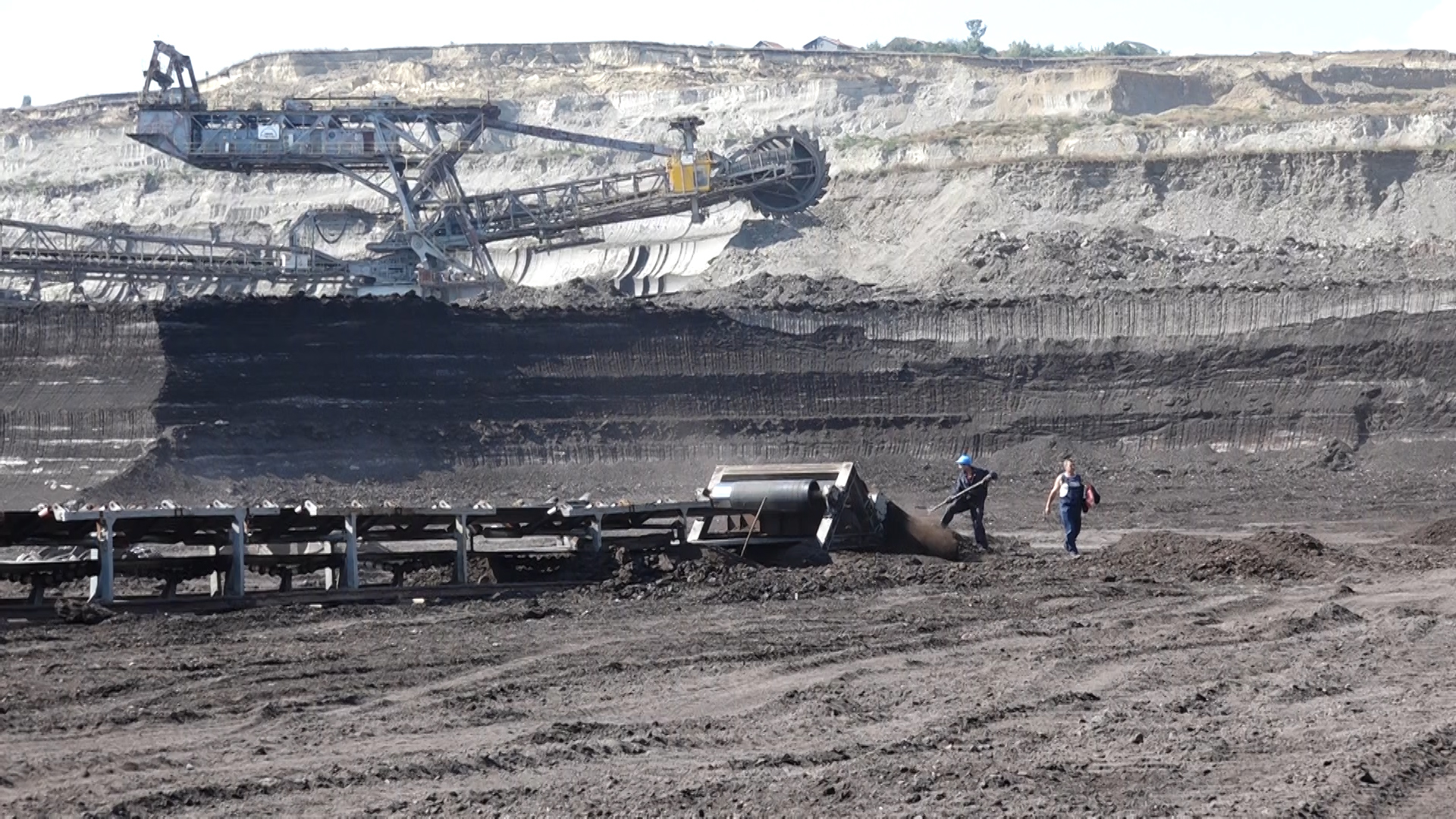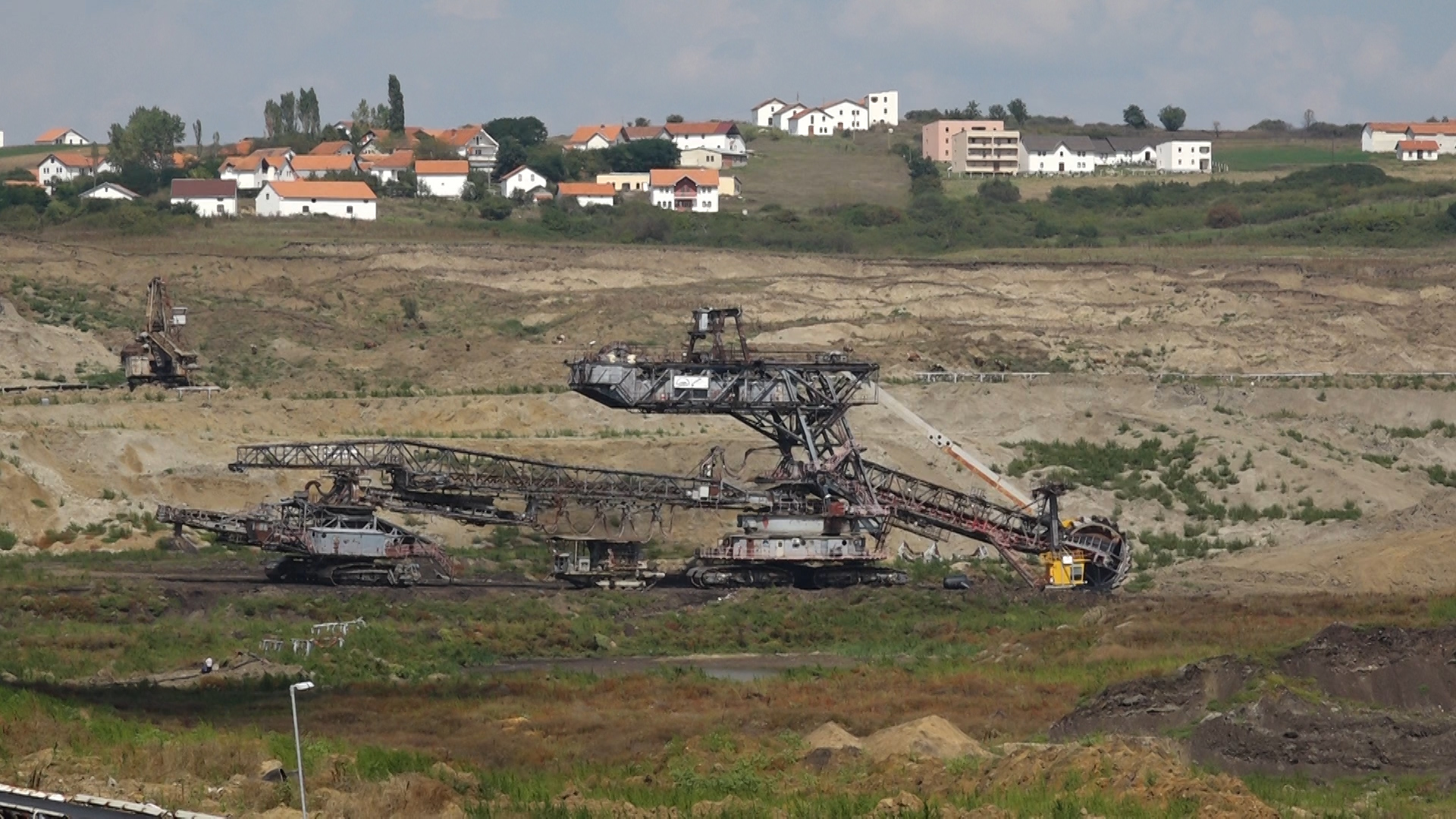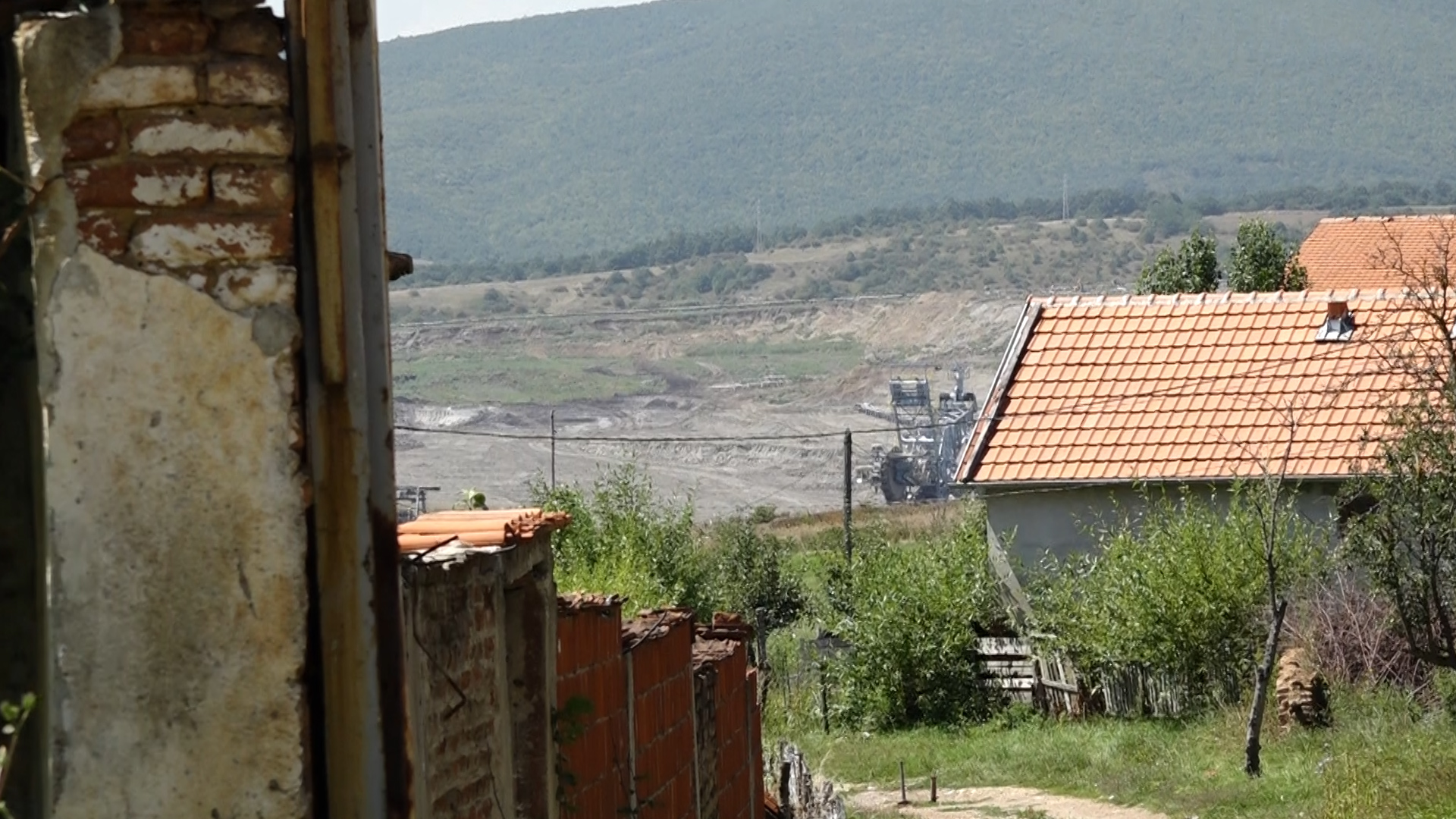The World Bank broke its own rules and contributed to the suffering of hundreds of Kosovars who were forced from their homes to make way for a coal mine, a leaked report reveals.
Ragip Grajcevci, a 51-year old former guerrilla fighter for the Kosovo Liberation Army, KLA, lost an eye and a finger during the war in 1999. Today, 17 years later, he has lost his patience with the constant smog churning out of Europe’s most polluting coal-fired power plant.
“Kosova is independent, the war is finished, but my battles for a dignified life in this country are ongoing because now we have an enemy that is killing us slowly even in peacetime,” says Grajcevci.
Grajcevci lives in Hade, a village outside the capital Prishtina. Only a fragment of it remains, perched on the lip of the state-owned Sibovc mine. Coal often spontaneously combusts in the mine below, sending dust and smoke billowing through gardens and homes. The noise of the constant digging grates on the nerves, according to families still living there.
As a representative on his local council Grajcevci is determined not to join the ranks of a thousand or so villagers who have been unjustly resettled when the Kosovo government goes ahead with a World Bank-funded project to construct a new power plant called Kosova e Re (New Kosovo), despite the fact that it has become increasingly controversial for the World Bank to support any new coal-fired power plants.
Kosova e Re is the only coal plant on earth the World Bank is considering backing.
Kosova e Re is the only coal plant on earth the bank is considering backing. World Bank guidelines mandate that people who are resettled by their clients, whether they be governments or private companies, provide adequate homes and livelihoods to those who will be resettled. Grajcevci says in the case of Kosova e Re, none of this has happened.
In June 2015, Grajcevci submitted a complaint to the bank’s Inspection Panel, or IP, a body that deals with individuals and communities who feel that they have been or are likely to be adversely affected by a bank-funded project. Since 2011, the World Bank has been advising six different Kosovo governments and has been a continuous supporter of Kosovo’s energy sector, 97% of which is fueled by coal.
The report, finalized in September by the bank’s Inspection Panel and seen by Prishtina Insight and Climate Home, investigated two waves of bungled, incomplete resettlement in the village of Hade in 2004-5 and 2012.
More than a decade after the appropriations began, the fragmented community continues to be insecure and frustrated, the report said. While the World Bank was not the primary agent, the panel found failings on the part of the bank contributed to “real and often severe harm” over a “prolonged period”.
Their report has been passed to the World Bank board, which will meet to discuss it in December. Marco Mantovanelli, the bank’s country manager for Kosovo, said he could not comment until the report was made public “preserve the integrity of the Panel’s processes.”
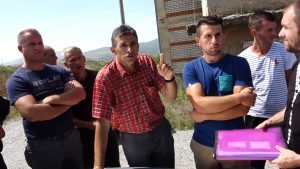
Ragip Grajcevci talking to his fellow villagers. | Photo: BIRN.
Grajcevci does not want to wait any longer.
“I am tired of living under dust, noise, of seeing people die of cancer around me and not being able to plan our futures here because of the dirty coal that is being dug right next to our doorstep,” said Grajcevci, who has witnessed families from his village involuntarily displaced in bits and pieces for the last decade.
Lignite is the dirtiest form of coal and, according to The Health and Environment Alliance and Association of Pulmonologists of Kosovo, existing coal plants in Kosovo cause a total health cost between 70 and 169 million euros per year to the region. Due to long-distance travel of pollutants in the air, Kosovo power plants cause a total health cost between 144 and 352 million euros per year to Europe. Plants in Kosovo generally operate with low environmental standards, generating high levels of polluting emissions and high impacts on health, causing diseases like lung cancer, skin conditions and respiratory problems such as asthmatic bronchitis.
Shala village, 10 kilometers away from the surface mine, was supposed to be the location which Kosovo government chose to move thousands of people from the villages close to the plant. The place was supposed to have a school, a medical clinic and a cemetery – but none of these have been built because the project, which was supposed to be finished by now, began to be built in 2013.
Today, parts of Shala look like a bare field with only the main road has been finished. It has been romantically renamed “New Hade,” since it is supposed to host all the inhabitants of “Old Hade.” On a recent visit, the side roads of this “New Hade” were laid with gravel and a stream of sewage water flowed next to the homes
We have become poorer as a result of the lack of care from these institutions who claim to be doing all this ‘economic development’ Ragip Grajcevci
The lack of infrastructure is one reason why only 22 families have moved here and half of the built homes look empty.
“The World Bank and the Kosovo government have repeatedly lied to us when they promised they will improve our livelihoods by moving villages,” said Grajcevci. “We have become poorer as a result of the lack of care from these institutions who claim to be doing all this ‘economic development’ in the name of fighting poverty.”
During one of the protests against such a treatment Grajcevci met with Dajana Berisha from the Forum for Civic Initiative, a grassroots organization that does community development work. Berisha picked up the cause of the villagers and got their trust to write and submit the complaint to the World Bank Inspection Panel.
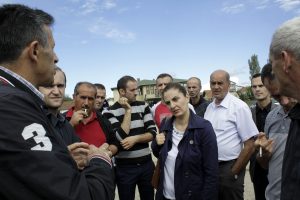
Dajana Berisha from FIQ meets the inhabitants of Hade. | Photo: Ridvan Slivova.
The complaint which Berisha wrote on behalf of the Hade community, argued that the villagers had suffered a “loss of land, livelihoods and wellbeing as a result of the bank’s non-compliance with its own policies in its technical assistance to prepare a framework designed to forcefully resettle us to make way for a Bank financed new coal power plant.”
The Inspection Panel delivered a report to the bank’s executive directors on September 14, 2016 confirming these claims.
The Panel found that the bank management was not in compliance with operational procedures on involuntary resettlement, as “the resettlement policy framework did not include principles and methods for the valuation of assets of affected people living under the restrictions of the Zone in the New Mining Field.”
“We hit big!” said Berisha after receiving the Inspection Panel decision. “The Panel’s decision is a victory in so many levels. When I met these villagers they were smart and strong and willing to go very far to get their rights set straight, but they lacked information about their rights and felt intimidated by the arrogance of the officials from Kosovo institutions and the World Bank who would occasionally visit them.”
Now, the community can not be looked down and ignored by anyone, this decision proves they were right all along Dajana Berisha
“Now, the community can not be looked down and ignored by anyone, this decision proves they were right all along – it is a moral victory that gives the community an upper hand in the debate about building the third coal power plant that the World Bank is planning to support during the following year” she continued.
The finding that the resettlement in 2004 was never completed is particularly damning for the United Nations Mission in Kosovo and the United States Embassy in Kosovo. Diplomatic cables released by Wikileaks reveal the callous way the displaced villagers were viewed by those in charge in Kosovo during the transition to independence.
Unmik did not respond to a request to comment. The US state department said it would not comment on the leaked diplomatic cables.
The community’s claims are also being investigated by Kosovo Ombudsperson Hilmi Jashari, who is looking into human rights violations and environmental hazards under which citizens of Obiliq municipality are currently living.
“You might as well change the name of this place to Balkan Chernobyl, rather than call it Obiliq,” said Jashari, standing on top of a ridge with people from Hade and Shipitulle, another affected village, looking down to the vast surface-mining space of Kosovo Electric Company, KEK, which has been operating the coal plants since 1962.
“These sort of living conditions are [comparable to] 19th century standards; unacceptable to be living under in 21st century Europe,” he added.
On average, Kosovars have a life expectancy ten years shorter than people in Western Europe. Moreover, according to the World Bank, over 100 million euros a year are spent on treating respiratory diseases, which are most prominent in Kosovo’s central and Obiliq regions, where smoke from the chimneys of the power plants is part of the landscape and often even disguises the sunsets in Prishtina.
There is a game going on, a vicious horrible game with people's lives. Ted Downing
Ted Downing, a leading expert on the field of displacement, runs the International Network on Displacement and Resettlement. He has studied the case of Hade and claims that the World Bank and Kosovo government are playing people against profit, asking them to absorb the cost of development in their own lives, livelihoods, budgets, and the social-psychological stress.
“There is a game going on, a vicious horrible game with people’s lives where the cost of displacing them [by international standards for resettlement] is being pushed back and pushed down and because if they are not paying that cost, the profitability of the mine increases,” said Downing.
“The methodology being used today is exactly the same methodology that was used during socialist times”, explained Downing, “with the only difference being the presence of the World Bank advising and changing the laws so they would fit with their agenda”
In September, KEK began a new round of negotiations with several hundred more village inhabitants, who have to be displaced in order to make way for new excavations for coal digging.
“If we don’t start mining in the new mining field by the end of the next six months, we will run out of our coal reserves to feed the current existing plants”, said Adil Jonuzi, the head of coal division in KEK.
“My heart sinks when I see these two beauties lying still and not in function,” says the engineer, referring to the excavators that were standing still.
“We made sure those excavators stopped digging because they came closer than 250 meters to the villagers’ homes and that is against the mining law in Kosovo,” explained the Ombudsperson during his inspection in Hade and Shipitulle to check whether KEK has adhered to the terms of his ban.
Jashari highlights that KEK and the government have only themselves to blame because they delayed the process of land appropriation and displacement of the villages, thus paving the way for a lot of building to be illegally built. Jashari said his office is investigating if this, too, constitutes an abuse of office.
“The village of Shipitulle, opposite Hade, has had an enormous amount of illegal new buildings built in a time when they were next in line to be displaced and compensated. Of course, we are investigating whether the local and national authorities, together with KEK, delayed the process of moving this village in order to allow for someone to get rich out of financial compensations for these buildings once the population is displaced,” said Jashari.
The other observation of the IP report highlights the shortcomings of the infrastructure of Shala, a village outside the mining zone where the displaced villagers were supposed to move.
“The panel also notes as a shortcoming of the Shala RAP [resettlement action plan] the inattention paid to the livelihood strategies for all the affected households, including the most vulnerable and poorest especially given this RAP is intended as a model for future resettlement in the New Mining Field,” says the report.
Haqif Shala, a representative of Shala village who was moved there in November 2014 from the temporary housing after having to evacuate Hade in 2012, said that the rest of the Obiliq residents who are supposed to be resettled in this new location should not accept the move.
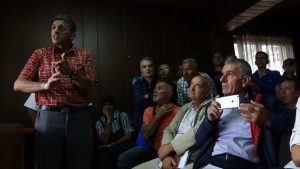
Ragip Grajcevci during a town meeting. | Photo: BIRN.
“The promised infrastructure that should have been finished by the Ministry of Spatial Planning with the World Bank support is not ready – we lack electricity, while roads and the sewage system are not finished,” he said while showing us a place where a stream of sewage water flowed through the gravel next to houses.
“I could keep cows in my previous home [in Hade], I had a garden. Here it’s not allowed,” Shala says. “We can’t even keep hens.”
The government has dismissed these concerns. Arben Citaku, the secretary of the Ministry of Spatial Planning, told a parliamentary hearing “the ministry has resolved the problem of the new location and defined the further steps that needs to be worked on… we believe the same economic status of villagers that moved to [New Hade] has been preserved, even though we might not have improved that status”.
Requests to the government to comment on the report were ignored.
Rob Doherty, a spokesman for the panel, said that until then he could not comment on the contents of the leaked report.
“It remains confidential until the Board has had the opportunity to formally consider it,” he said.
The unlawful displacements have divided the community in Obiliq. Grajcevci is determined that the era in which authorities and the World Bank can take over their land is over. He said the quality of life has diminished, schools have emptied of children, and basic foodstuffs like bread are no longer available. He called on his neighbors to resist the displacement.
“Now, we have learned a lesson that if we don’t unite as a community we will be trampled upon, we will be tricked and become poorer, as a result we will not allow them to divide and rule us, we’ve had enough!”
Jeta Xharra is the executive director of BIRN Kosovo. Karl Mathiesen is a writer for Climate Home.






